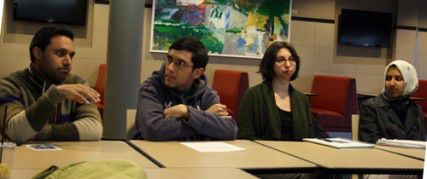
Reem Al Ghanem, a graduate student in the School of Education, was walking on the city street one day when a passerby asked:
“Why are you wearing that scarf on your head? You’re in America.”
“People would think that since I’m Muslim that I’m repressed and that I’m forced to wear the scarf,” Al Ghanem said at the Islamophobia Discussion Panel at the George Sherman Union on Tuesday night.
Al Ghanem, who is Muslim, was one of many panelists who shared their experiences with an audience of about 20 students.
The panel, hosted by the Islamic Society of Boston University, was part of Islam Awareness Week.
Islamic Society president Nida Shuttari, a senior in the College of Arts and Sciences, said the discussion would focus on students’ personal views on Islamophobia or “the fear of Muslims and Islam.”
“We had no set goal,” said Islamic Society member Tawsif Choudhury, a senior in the School of Management. “We didn’t expect people to leave here today knowing ‘x’, ‘y’ and ‘z.’ We wanted to hear [the students’] opinions.”
The panel began with a conversation about comic book heroes and the emergence of a Muslim superhero in the DC Universe comics, which stemmed into personal memories of Sept. 11 and the assumptions that have been made about Muslim fashion, lifestyle, religion since then.
When asked what comes to mind when one thinks of a Muslim person, students brought up connections to public figures such as President of the Islamic Society of North America Ingrid Mattson, memories of Muslim friends and peers after Sept. 11 and the discrimination many Muslim Americans have faced.
Other students touched on how American culture has given a negative connotation to the headscarf that some Muslim women wear. Students in the discussion argued that Americans have made the assumption that those who wear the headscarves are oppressed and forced to wear it.
Despite these prejudices, which some students called signs of “ignorance,” Al Ghanem said that it is inevitable and even understandable for Americans to make assumptions about Muslims.
“I don’t like to use the word ‘ignorant,’ but if that’s what Americans are, then I don’t really blame them,” Al Ghanem said. “I came here not knowing anything about any other religion because it wasn’t taught to me in school.”
Shuttari said the discussion not only reflected many positive responses, but also showed how much society can grow if people ask questions about unfamiliar subjects.
This is an account occasionally used by the Daily Free Press editors to post archived posts from previous iterations of the site or otherwise for special circumstance publications. See authorship info on the byline at the top of the page.



